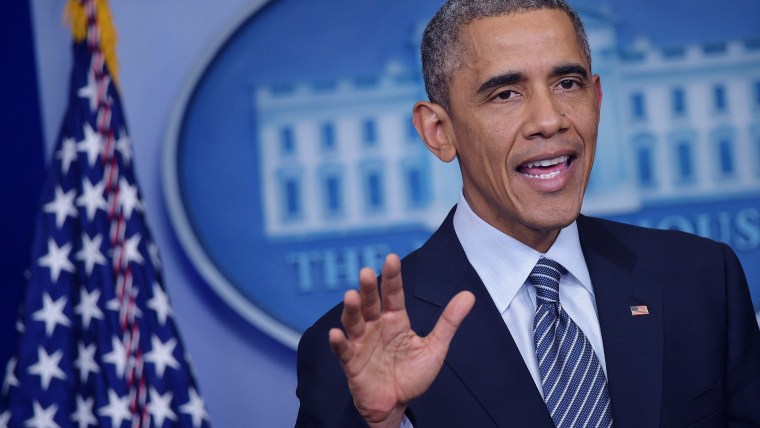About a week before the midterm elections, Dana Milbank published a column blasting President Obama, endorsing the argument that the president is a "passive bystander." The columnist argued, "The real problem with Obama is not overreach but his tendency to be hands-off."
Soon after, the entire thesis looked wildly off the mark -- Obama, far from the hapless spectator described by Milbank, took charge on issues ranging from immigration to the climate crisis to net neutrality. The president wasn't just watching events pass him by, content to do nothing while circumstances unfolded around him, Obama did the exact opposite, taking the reins and showing real leadership.
Which makes it all the more curious to see Milbank re-commit to the same mistaken thesis again today.
[O]n this issue [violence in Ferguson] as on many others -- notably the fight against the Islamic State and the need to find a new defense secretary -- Obama has demonstrated a preference to mull rather than to act. Former Obama Pentagon chief Leon Panetta, in his memoir, wrote that Obama too often "relies on the logic of a law professor rather than the passion of a leader." [...] Over time, such a cerebral process probably produces the best results. But crises don't wait for cogitation.
In this case, Milbank was disappointed that the president "had a meeting" at the White House to discuss developments in Ferguson. What the Beltway columnist would have preferred is to see the president go to the St. Louis area ... where Obama presumably could have had more meetings.
I'll confess to being mystified by the entire argument. Milbank sees the response to ISIS as an example of Obama preferring thought to action, but in reality, the president began launching airstrikes on ISIS targets in August -- long before Congress even considered authorizing force -- and soon after he unilaterally took the controversial step of expanding the mission into Syria. How is this an example of inaction? Isn't this actually evidence of the opposite?
At the Pentagon, Obama concluded his Defense Secretary was no longer the best person for the job, he asked for Chuck Hagel's resignation, and he's chosen a capable replacement. In what way does this point to passivity and indecision?
The point isn't that President Obama's leadership is perfect at all times, because it isn't. But it sometimes seems as if his critics' condemnations are wholly disconnected to the president's actual decisions.
On climate, Obama isn't just sitting around, thinking about how nice it would be if others agreed with him; he's taking control, using every power at his disposal, and even striking a deal with China that most considered impossible.
On Russia, Obama isn't just mulling competing options, waiting for Vladimir Putin to be more responsible; he's taking the international lead in isolating and punishing Putin and his autocratic government.
On immigration, Obama isn't just waiting for a Congress that refuses to govern; he's using every lever of the executive branch to help millions of families right away.
On Ebola, Obama hasn't just presented cerebral truths and expected the world to listen; he's been one of the key global leaders in addressing the outbreak and saving lives.
On Syria, it was Obama that disarmed the Assad regime of its chemical weapons. On Iran, it's Obama that opened the door to historic nuclear talks. On health care, it's Obama that passed health care reform, bringing health security to millions, after a century of presidents who only talked about it.
We can certainly have a spirited debate about these policies on the merits. Reasonable people can, will, and should disagree about contentious topics, and just because Obama is showing bold leadership doesn't mean he's leading in the best direction.
But the point is, this president is doing exactly what voters elected him to do: he's taking charge on the issues that matter most to him and advancing his agenda by every possible means. To see pundits complain that Obama "has demonstrated a preference to mull rather than to act" is to look at the Obama presidency in a fun-house mirror in which reality is distorted to an unrecognizable degree.
